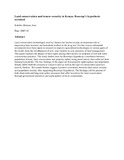| dc.contributor.author | Kabubo-Mariara, Jane | |
| dc.date.accessioned | 2013-07-17T06:12:00Z | |
| dc.date.available | 2013-07-17T06:12:00Z | |
| dc.date.issued | 2007-10 | |
| dc.identifier.citation | Ecological Economics Volume 64, Issue 1, 15 October 2007, Pages 25–35 | en |
| dc.identifier.uri | http://www.sciencedirect.com/science/article/pii/S0921800907003473 | |
| dc.identifier.uri | http://erepository.uonbi.ac.ke:8080/xmlui/handle/123456789/48214 | |
| dc.description.abstract | Land conservation technologies used by farmers are known to play an important role in improving farm incomes and household welfare in the long run. For this reason substantial investments have been made in research to improve agricultural technologies in various parts of the world, from the development of new crop varieties to new practices of land management. This paper explores the impact of land rights among other factors on adoption of soil and water conservation practices. The study further tests for Boserup's hypothesis (correlation between population density, land conservation and property rights) using panel survey data collected from farming households. The key findings of the paper are that property right regimes and population density affect both the decision to conserve land as well as the type of conservation practices used by farmers. The results further suggest a positive correlation between land tenure security and population density, thus supporting Boserup's hypothesis. The findings call for pursuit of both short-term and long-term policy measures that offer incentives for land conservation through government initiatives and participation of local communities. | en |
| dc.language.iso | en | en |
| dc.publisher | University of Nairobi | en |
| dc.subject | Land conservation; Tenure security; Population density; Kenya | en |
| dc.title | Land conservation and tenure security in Kenya: Boserup's hypothesis revisited | en |
| dc.type | Article | en |
| local.publisher | School of Economics | en |

